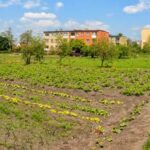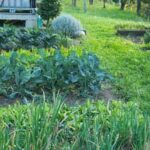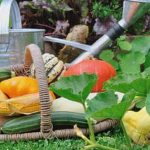Is rubber mulch safe for vegetable gardens? As gardening enthusiasts explore alternative options for mulch, rubber mulch has gained popularity in recent years. While it offers several benefits, such as weed control and durability, there are also concerns about its safety, particularly when used in vegetable gardens. In this article, we will delve into the world of rubber mulch, exploring its composition, safety considerations, environmental impact, research findings, best practices for use, alternative options, and frequently asked questions.
Rubber mulch is a popular choice for gardeners seeking a low-maintenance and long-lasting option for mulching their vegetable gardens. Made from recycled tires and available in various colors and textures, rubber mulch offers an aesthetically pleasing alternative to traditional organic mulches. However, before incorporating rubber mulch into your vegetable garden bed, it is essential to consider the potential safety concerns associated with its use.
One of the primary safety concerns regarding rubber mulch is the potential risk of chemical leaching and heat absorption. As rubber breaks down over time due to exposure to sunlight and environmental factors, there is a possibility that harmful chemicals could leach into the soil and subsequently be absorbed by the vegetables.
Additionally, the heat-absorbing properties of rubber mulch may affect the soil temperature and impact plant growth. These concerns raise questions about whether using rubber mulch in vegetable gardens is indeed safe for both plants and human consumption.
What Is Rubber Mulch?
Rubber mulch is a popular alternative to traditional organic mulches, and it is made from recycled rubber materials such as old tires. This type of mulch has gained popularity in gardening due to its durability, low maintenance, and long-lasting properties. With the increasing interest in sustainable gardening practices, many gardeners have turned to rubber mulch as an environmentally friendly option for their vegetable gardens.
There are different types of rubber mulch available in the market, including nuggets, shredded pieces, and poured-in-place surfaces. Each type offers unique benefits and is suitable for various garden settings. Additionally, rubber mulch comes in a variety of colors and textures, allowing gardeners to customize the look of their garden while still reaping the benefits of using this material.
Despite its popularity, some safety concerns have been raised regarding the use of rubber mulch in vegetable gardens. One main concern is the potential risk of chemical leaching from the rubber material into the soil. Additionally, there is also a concern about heat absorption, particularly in warmer climates, which can affect plant growth. However, with proper installation and maintenance techniques, these potential risks can be mitigated.
Overall, understanding what rubber mulch is and its characteristics can help gardeners make an informed decision about whether it is suitable for their vegetable gardens. It’s important to weigh the benefits against any potential drawbacks when considering using rubber mulch as a landscaping material.
| Rubber Mulch Type | Color/Texture |
|---|---|
| Nuggets | Various colors and textures available |
| Shredded pieces | Options for different colors and textures |
| Poured-in-place surfaces | Can be customized to desired color and texture |
Safety Concerns
When considering using rubber mulch in vegetable gardens, it’s essential to address the safety concerns associated with this material. While rubber mulch offers benefits such as weed prevention and moisture retention, there are potential risks that gardeners should be aware of. Here are some of the main safety concerns related to using rubber mulch in vegetable gardens:
1. Chemical Leaching: One of the primary concerns with rubber mulch is the potential for chemical leaching into the soil. Rubber mulch is made from recycled tires, which may contain toxins and heavy metals that can leach into the ground over time. This can potentially contaminate the soil and affect the quality and safety of the vegetables grown in it.
2. Heat Absorption: Another safety concern is the heat absorption properties of rubber mulch. On hot days, rubber mulch can absorb and retain heat, which may affect the temperature of the soil underneath. This can impact plant roots and other beneficial microorganisms in the soil.
3. Environmental Impact: In addition to its impact on soil and plant health, there are also environmental concerns associated with using rubber mulch in vegetable gardens. The long-term effects on surrounding ecosystems and water sources should be carefully considered before choosing to use rubber mulch.
As gardeners weigh the benefits and drawbacks of using rubber mulch, it’s crucial to stay informed about these safety concerns and take necessary precautions when using this material in vegetable gardens.
Environmental Impact
When considering the environmental impact of using rubber mulch in vegetable gardens, there are several factors to take into account. One of the main concerns is that rubber mulch does not decompose like organic materials, which means it can build up over time and affect the soil’s ability to absorb water and nutrients. Additionally, rain or irrigation water can wash small rubber particles into surrounding areas, potentially causing pollution in the ecosystem.
Another issue related to the environmental impact of rubber mulch is its potential long-term effects on soil health. Some studies have shown that chemicals from rubber mulch can leach into the soil, affecting microbial activity and overall soil quality. This can disrupt the natural balance of beneficial organisms in the soil and have lasting consequences for plant growth and development.
It is essential for gardeners to consider these environmental factors when deciding whether to use rubber mulch in their vegetable gardens. While it may offer immediate benefits such as weed suppression and moisture retention, the long-term implications on the environment must be carefully weighed. In many cases, organic mulching options such as wood chips, straw, or compost may be more environmentally friendly choices for vegetable gardens.
| Environmental Impact Factors | Considerations |
|---|---|
| Non-decomposable material | Can build up over time and affect soil’s ability to absorb water and nutrients |
| Chemical leaching | Potential impact on soil microbial activity and overall soil quality |
Research and Studies
When considering the use of rubber mulch in vegetable gardens, it is essential to evaluate any existing research or studies on its safety and potential impact on plants and soil. Several studies have been conducted to investigate the effects of rubber mulch in gardening settings, providing valuable insights for gardeners.
Existing Research
One study published in the Environmental Science & Technology journal assessed the leaching of chemicals from rubber mulch into the soil. The results showed that certain chemicals present in rubber mulch, such as zinc, manganese, and iron, could leach into the surrounding soil over time. While these findings raise concerns about potential contamination and impact on plant growth, more research is needed to fully understand the extent of these effects.
Another study conducted by the University of Georgia Extension evaluated the heat absorption properties of rubber mulch compared to organic materials like wood chips. The research revealed that rubber mulch can significantly increase soil temperature, which may affect the growth and development of certain vegetable crops. This finding suggests that careful consideration should be given to using rubber mulch in vegetable gardens, especially in regions with hot climates.
Credibility and Recommendations
It is important for gardeners to critically assess the credibility of research studies when making decisions about using rubber mulch. Seeking information from reputable sources and peer-reviewed journals can help individuals make informed choices based on scientific evidence rather than anecdotal claims or marketing hype. Additionally, consulting with local agricultural extension offices or horticultural experts can provide valuable guidance on best practices for using rubber mulch in vegetable gardens based on current research findings.
Best Practices for Using Rubber Mulch
When using rubber mulch in vegetable gardens, it is important to follow best practices to ensure the safety of the plants and the environment. First and foremost, it is essential to choose rubber mulch that is specifically labeled as safe for use in gardens. Look for products that have been tested for harmful chemicals and heavy metals, and avoid using recycled rubber from unknown sources.
Proper installation is key when using rubber mulch. It should be laid down evenly at a depth of 2-3 inches to provide adequate insulation for the soil and roots while allowing water and nutrients to penetrate. It is also important to install a barrier such as landscaping fabric underneath the rubber mulch to prevent it from sinking into the soil over time.
Regular maintenance is crucial when using rubber mulch in vegetable gardens. Inspect the mulch periodically for signs of wear or deterioration, and replace any damaged pieces as needed. Additionally, keep an eye on weed growth and remove any unwanted plants that may try to take root in the mulch.
While using rubber mulch can be an effective way to conserve moisture and suppress weeds in vegetable gardens, it is also important to consider alternative mulching options. Organic materials such as wood chips, straw, or compost can provide similar benefits without potential concerns about chemical leaching or environmental impact. By exploring different options, gardeners can find the best solution for their specific needs while minimizing potential risks associated with rubber mulch.
Alternative Mulching Options
When it comes to mulching your vegetable garden, rubber mulch is not the only option available. In fact, there are many alternative mulching materials that can be just as effective and safe for your plants. Consider the following options when deciding on the best mulch for your vegetable garden.
Organic Mulch
One of the most popular alternatives to rubber mulch is organic mulch, which includes materials such as straw, wood chips, and shredded bark. These natural materials can provide a range of benefits to your vegetable garden, including improved soil structure, moisture retention, and weed suppression. Organic mulch also breaks down over time, adding valuable nutrients to the soil.
Compost
Using compost as mulch in your vegetable garden not only helps in retaining moisture and suppressing weeds but also enriches the soil with essential nutrients. Compost is an environmentally friendly choice that allows you to recycle organic waste from your kitchen or yard into a beneficial amendment for your garden.
Grass Clippings
If you have a lawn, collecting grass clippings after mowing can be an economical and practical way to add nutrients back to your vegetable garden. Grass clippings act as a natural fertilizer and help to retain soil moisture. However, it’s important to use grass clippings that have not been treated with herbicides or pesticides.
By considering these alternative options for mulching in your vegetable garden, you can still achieve the benefits of moisture retention, weed suppression, and improved soil health without using rubber mulch. Each material has its own unique advantages, so choose one that best fits the needs of your garden and aligns with your environmental values.
Conclusion
Using rubber mulch in vegetable gardens can be a convenient option for many gardeners, but it is not without its drawbacks. Consider the following before choosing rubber mulch for your vegetable garden:
- Chemical leaching: Rubber mulch may contain chemicals that can potentially leach into the soil and affect the quality of the vegetables grown.
- Heat absorption: Rubber mulch has been known to absorb heat, which can increase soil temperature and affect plant growth.
- Environmental impact: The long-term effects of using rubber mulch on the soil and surrounding ecosystem are still being studied, so it is important to consider the potential environmental impact.
When using rubber mulch in vegetable gardens, it is crucial to follow best practices to minimize any potential risks. Consider the following guidelines:
- Proper installation: Ensure that the rubber mulch is installed correctly and does not come into direct contact with the edible parts of the vegetables.
- Maintenance: Regularly check the condition of the rubber mulch and replace any damaged or deteriorating pieces to prevent chemical leaching.
- Monitoring soil health: Keep an eye on the health of the soil and surrounding plants when using rubber mulch, and make adjustments as needed to maintain a healthy growing environment.
Overall, while rubber mulch may offer certain benefits for vegetable gardens, it is essential for gardeners to consider alternative options such as organic mulch and compost. These natural materials provide nutrients to the soil and have minimal environmental impact compared to rubber mulch. It is always best to weigh the pros and cons carefully before making a decision on which type of mulch to use in your vegetable garden.
FAQs About Rubber Mulch for Vegetable Gardens
In conclusion, the use of rubber mulch in vegetable gardens raises valid safety and environmental concerns that should not be ignored. While rubber mulch offers benefits such as weed suppression and moisture retention, gardeners must weigh these advantages against the potential risks associated with chemical leaching and heat absorption. It is essential for vegetable gardeners to consider alternative mulching options, such as organic mulch and compost, which provide natural nutrients to the soil without posing potential harm.
Based on the research and studies reviewed in this article, there are credible concerns about the long-term effects of using rubber mulch in vegetable gardens. The environmental impact on soil and surrounding ecosystems cannot be overlooked, making it crucial for gardeners to evaluate the sustainability of their gardening practices. Additionally, implementing best practices for using rubber mulch, including proper installation and maintenance techniques, can help minimize any potential risks.
For vegetable gardeners considering using rubber mulch, it is recommended to thoroughly assess its safety implications and explore alternative options before proceeding. By prioritizing the health and sustainability of their gardens, gardeners can make informed decisions that align with their values and contribute to a safe and thriving environment. Ultimately, choosing natural materials for mulching not only promotes a healthier ecosystem but also ensures the long-term well-being of vegetable gardens.
Frequently Asked Questions
What Is a Negative About Rubber Mulch?
A negative aspect of rubber mulch is that it can retain heat, especially in hot climates, which may not be ideal for certain plants. It may also not break down and enrich the soil as natural mulch does.
Does Rubber Mulch Leach Into the Soil?
Rubber mulch has the potential to leach chemicals into the soil over time, which can be a concern for some gardeners. This leaching can impact the pH levels of the soil and affect the growth of plants if not properly managed.
Which Is Better Natural Mulch or Rubber Mulch?
The choice between natural mulch and rubber mulch depends on individual preferences and specific needs. Natural mulch is biodegradable, adds nutrients to the soil as it decomposes, and provides a more natural aesthetic.
On the other hand, rubber mulch offers longer-lasting color and can be more cost-effective in the long run but comes with potential environmental concerns related to its production and potential leaching into the soil.

If you’re looking to get into vegetable gardening, or are just looking for some tips on how to make your current garden better, then you’ve come to the right place! My name is Ethel and I have been gardening for years. In this blog, I’m going to share with you some of my best tips on how to create a successful vegetable garden.





